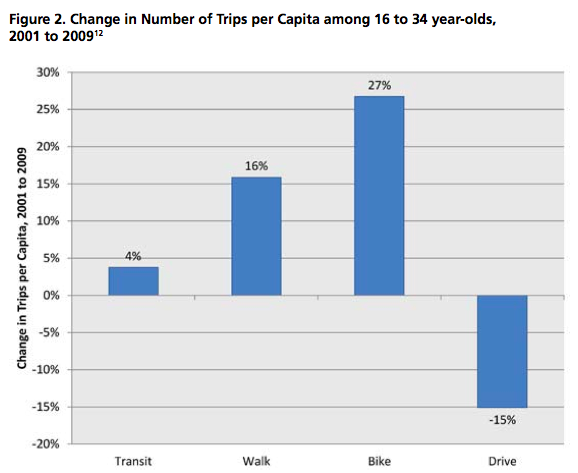
A raft of recent research indicates that young adults just aren't as into driving as their parents were. Young people today are walking, biking, and riding transit more while driving less than previous generations did at the same age. But the vast majority of state DOTs have been loathe to respond by changing their highway-centric ways.
A new report by the U.S. Public Interest Research Group points out the folly of their inaction: If transportation officials are waiting for Americans born after 1983 to start motoring like their parents did, they are likely to be sorely disappointed.
Though some factors underlying the shift in driving habits are likely temporary -- caused by the recession, for instance -- just as many appear to be permanent, the authors found. That means American transportation agencies should get busy preparing for a far different future than their traffic models predict.
"The Millennial generation is not only less car-focused than older Americans by virtue of being young, but they also drive less than previous generations of young people," write authors Tony Dutzik, Jeff Inglis, and Phineas Baxandall.
There's a good deal of evidence that the recession cannot fully explain the trend away from driving among young people. Notably, driving declined even among millennials who stayed employed, and "between the recession years of 2001 and 2009, per-capita driving declined by 16 percent among 16 to 34 year-olds with jobs," the authors write.
Even as the economy has rebounded, car commuting has declined, and the drop is most pronounced among younger workers. According to the Census, between 2006 and 2013, the share of commutes by driving or carpooling dropped 1.5 percent among workers 16 to 24, 1.3 percent among workers 25 to 44, and 0.5 percent among workers 45 and older. The drop in car commuting among 16- to 24-year-olds continued after the recession ended, though at a slower pace, falling 0.5 percent between 2009 and 2013.
There's also a big mismatch between the places where the recession hit hardest and the places where driving is dropping the fastest. "The states and urban areas that experienced the biggest increases in unemployment during the recession were generally not those that experienced the greatest declines in VMT," the authors write.
While economic factors can't be completely discounted, the authors argue that they are not as significant as longer-term shifts in attitudes. A survey by Deloitte, for example, found that millennials are three times more willing to give up their cars than their parents' generation. The National Association of Realtors found that today's young adults are more likely to view a car as "just transportation" and not inherently superior to other modes.
Driving rates peak between the ages of 35 and 55, and millennials will likely drive more as they reach that stage of life, but they will still drive less than their parents did during those years, the authors conclude. Standard traffic models that guide transportation spending decisions and forecast steadily increasing driving rates for years on end fail to account for these shifts.
Dutzik, Inglis, and Baxandall say policy makers need to respond immediately to prepare for a future where Americans aren't driving more every year. They recommend incorporating a greater degree of uncertainty to projections about how many cars are going to be on the road in the distant future.





